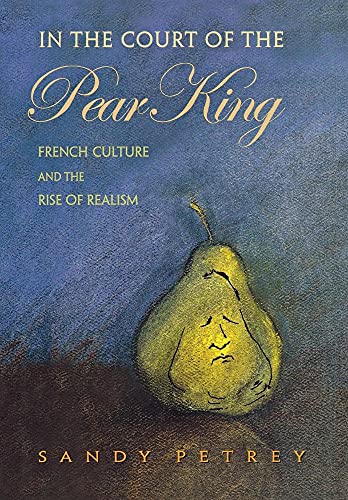In the Court of the Pear King: French Culture and the Rise of Realism
Petrey, Sandy
About the Book
Description:
May have limited writing in cover pages. Pages are unmarked. ~ ThriftBooks: Read More, Spend Less 0.15. Seller Inventory # G0801443415I4N00
About this title:
Synopsis:
The period 1830–1832 witnessed a remarkable series of cultural and political milestones in France. In 1830, a revolution overturned one monarchy, only to replace it with another. In 1831, Charles Philippon's caricature of Louis-Philippe, the new monarch, as a pear achieved extraordinary popularity. Drawn on walls from one end of France to another, the pear caricature became a national obsession. In that same year, George Sand moved from the provinces to Paris and challenged gender stereotypes by adopting men's clothes and writing fiction in a man's voice. During 1830–1832, Stendhal and Balzac developed the techniques of the realist novel that still dominate much of the world's fiction. Sandy Petrey explores the factors accounting for such consequential innovations in so short a time, so restricted a space. In Petrey's view, these disparate events betoken a common recognition of society's capacity to make and unmake what it recognizes as real.
Petrey's first two chapters explore the popularity of the pear caricature. The remaining chapters focus on Balzac, Stendhal, and Sand, addressing these writers' concern with society's power to define and transform the identity of its members. For Petrey their work continually recalls the hybrid character of Philippon's pear, both totally unlike the king and the king's spitting image. While the French government declared the July Revolution a nonevent and the July Monarchy an incontrovertible fact, French fiction concentrated on society's power to declare an individual a nonperson or to make presence out of absence, plenitude out of emptiness.
From the Inside Flap: "The work of a scholar at the top of his form, In the Court of the Pear King boldly takes on the period’s most famous authors, movements, texts, ideologies, and images to make a single but ever more complex argument from first page to last. Engaging and provocative throughout, the book does not shrink from controversy and is sure to make a splash."—Margaret Waller, Pomona College
"With imagination and panache, Sandy Petrey teases out subtle connections between the literature of nineteenth-century French realism and the politics of the July Monarchy. Taking seriously the 'pear' caricature of Louis-Philippe, the citizen-king, Petrey treats the fundamental contradiction in terms of Louis-Philippe’s revolutionary monarchy (or illegitimate legitimism) as a symptom of an impossible dualism. The pear comes to embody a nascent aesthetics of modernity, as shapeless and pulled apart as Balzac’s famous unknown masterpiece, as elusive as his Colonel Chabert’s undeadness. It symbolizes, as well, a nation in search of a coherent political form at a time when none was available; a nation caught in the grip of post-revolutionary value reversal and cross-dressed power typified by Aurore Dudevant’s taste for sartorial travesty, experiments with the masquerade of literary masculinity and adoption of George Sand as her nom de plume. Petrey marshals the critical armature of contemporary identity theory--essentialism and constructionism--to explain how realism took hold as a genre of artistic expression that mediated the anxiety over the loss of revolutionary idealism besetting the worlds of the Salon and the performing arts. As the representational mode, par excellence of "socialized reality" realism in Petrey’s ascription, emerges not just as the aesthetic dominant and equivalent for its time, and not just as a caricature of the revolution that failed, but most importantly, as a narrative strategy of historical constructedness, revelatory of a sham world. In this guise, realism continues to exert its demystifying charm to this day; naturalizing and denaturalizing the real."—Emily Apter, New York University
Bibliographic Details
Title: In the Court of the Pear King: French ...
Publisher: Cornell University Press
Publication Date: 2005
Binding: Hardcover
Condition: Very Good
Dust Jacket Condition: No Jacket
